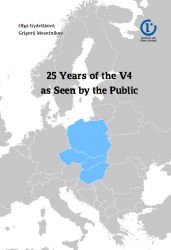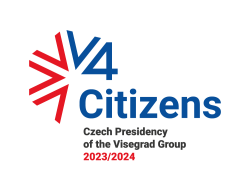
Thu 2 May 2024
Warszawa (PL)
24/11°C
| Wed | Thu | Fri | Sat | Sun |
|---|---|---|---|---|
| 25 | 24 | 25 | 24 | 24 |
Thu 2 May 2024
Praha (CZ)
23/14°C
| Wed | Thu | Fri | Sat | Sun |
|---|---|---|---|---|
| 24 | 23 | 20 | 24 | 19 |
Thu 2 May 2024
Bratislava (SK)
21/12°C
| Wed | Thu | Fri | Sat | Sun |
|---|---|---|---|---|
| 23 | 21 | 21 | 23 | 21 |
Thu 2 May 2024
Budapest (HU)
23/13°C
| Wed | Thu | Fri | Sat | Sun |
|---|---|---|---|---|
| 24 | 18 | 20 | 24 | 22 |
Key Findings—25 Years of the V4 As Seen by the Public
The public opinion surveys in all V4 countries were conducted between May and July 2015. Samples are representative of the adult (18+) population in each V4 country. The fieldwork was conducted by STEM Czech Republic, Tárki Hungary, Stratega Poland and Focus Slovakia.
by Oľga Gyarfášová and Grigorij Mesežnikov
- The public opinion poll conducted in four countries of the Visegrad Group in the spring of 2015 showed that the highest level of awareness of the V4 and Visegrad cooperation is in Slovakia: 54% of Slovak respondents said they heard of the Visegrad Group and knew what it was about, compared to 37% of the Czechs, 26% of the Hungarians, and only 17% of the Poles. This fact reflects a strong interest of Slovak political representation in intense political cooperation within the V4 that can be “traced” back to the period when Slovakia struggled to return to the road of EU integration after the 1998 parliamentary elections.
- The current level of public awareness of the V4 can be compared with 2001. While in Slovakia it has remained almost unchanged, in Hungary and Poland it decreased considerably. In the Czech Republic, on the contrary, the proportion of those who have heard of the Visegrad Group slightly increased.

- The Visegrad cooperation is considered as meaningful and important by 70% of Slovaks, compared to about 50% of the Czechs and 40% of the Hungarians and the Poles. The V4 cooperation actually does not have any opponents in four Visegrad countries.
- According to respondents in all four countries, the most important is definitely the economic and trade cooperation, followed by defence and security cooperation, and representation and promotion of common interests in the European Union. The perception of importance of individual areas of cooperation clearly shows that Visegrad citizens focus mostly on the issues of economic and social development.
- The indicator of relations among V4 countries is mutual trust and the belief of the public that they can rely on the other country or nation. In a long term, the above-average level of trust is between the Czechs and the Slovaks—almost four fifths of respondents in the two republics trust the other country. As for the trustworthiness, in the eyes of the Slovak public the most trustworthy are the Czechs (78%), Austrians (49%), and Poles (40%), while Hungarians took only the ninth place (30%). The strongest level of trust towards other V4 countries can be observed in Poland, where they occupied top three positions on the scale of trustworthiness: Slovaks ranked first with 69%, followed by the Czechs (61%), and Hungarians (61%). In the eyes of the Czech public, the most trustworthy were the Slovaks (79%) and French (59%), followed by Poles, Britons, and Austrians (58% each), while the Hungarians with 37% took the 6 ninth place. Hungary is the only V4 country, where the public shows the highest level of trust towards the country outside the Visegrad Group – Germany (62%). Poland ranks second (58%), while the Czech Republic and Slovakia (40% both) share the fourth and the fifth places.
- In the long term, the Visegrad countries differ in their attitude towards the United States and Russia. Although all being the NATO members, they trust the key country of the Transatlantic Alliance to a different extent. The highest degree of trust towards the United States is in Poland (50%), the lowest one in Slovakia (27%). The Polish public feels the highest level of distrust towards Russia; on the contrary, Slovaks feel the highest level of trust.
- An important part of the survey was to study the intensity scale of mutual contacts (of touristic, commercial, consumer, and cultural character) among the inhabitants of individual countries of the Visegrad Group. Here too the abovestandard relations between Czechs and Slovaks are vital—43% of Slovaks said they had a family member in the Czech Republic, and one fifth of Czechs have relatives in Slovakia. When asked about friends, the proportions were even higher—62% of Slovak respondents have friends among the Czechs, and 59% of Czechs have friends among Slovaks. The dense network of relations, inherited from the period of common Czechoslovak state, and further expanded and deepened after 1993, creates conditions for other positive evaluations, for instance in case of the mutual trust.
The project was supported by the International Visegrad Fund and coordinated by the Institute for Public Affairs.







